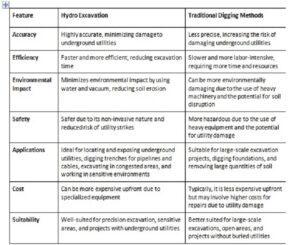A comparative study by the Construction Industry Institute indicates that hydrovac excavation has proven to significantly reduce project timelines by an average of 25%, as opposed to traditional excavation methods.
Moreover, the same study demonstrates a noteworthy 30% decrease in overall project costs when utilizing hydrovac techniques. These findings underscore the concrete advantages of hydrovac excavation in terms of efficiency, cost-effectiveness, and safety, positioning it as a compelling choice for projects prioritizing precision and minimal disruption.
In the realm of excavation, the decision between hydrovac and traditional methods plays a pivotal role in project success. Hydrovac, employing water pressure and suction, diverges from the conventional approach involving heavy machinery.
This blog aims to compare Hydrovac and Traditional Excavation, providing a concise overview to assist you in making informed decisions for your project. Whether your focus is on cost, environmental impact, or speed, having a comprehensive understanding of these excavation methods is crucial for making prudent choices in construction and development.
What is hydrovac excavation?
Hydrovac excavation is a method that breaks up soil with pressurized water and collects it with a vacuum, ensuring safe excavation around underground structures.
In other words, hydrovac is a safe digging method that involves using pressurized water and a vacuum for soil excavation. The pressurized water breaks up the soil, and the vacuum collects debris and water into a holding tank for disposal. This approach ensures safe and efficient soil excavation without causing harm to underground utilities or other structures.
What is traditional excavation?
Traditional excavation approaches employ tools like backhoes and shovels, which entail manual digging into the ground to extract soil and other materials. While these methods can yield results, they tend to be time-consuming, labor-intensive, and risk causing damage to underground utilities or other structures.
Traditional excavation relies on heavy machinery, posing a higher risk of damaging utilities and causing environmental disruption. In contrast, hydrovac excavation uses pressurized water for precision, minimizing risks to existing infrastructure and reducing environmental impact. Hydrovac is particularly advantageous for intricate projects and urban settings due to its safety and efficiency.
Example:
For instance, you need to dig near underground pipes in your backyard to fix a water line. Traditional digging would require a big digging machine, which might accidentally damage your pipes. Hydrovac, however, uses water to gently expose the pipes without exposing them to danger. It’s like the difference between using a sledgehammer and a precision tool when you need to be careful around something delicate.
Why is hydrovac excavation essential?
Hydro Excavation is a cutting-edge method that employs high-pressure water and vacuum technology to excavate soil without jeopardizing vital underground utilities. In colder climates, hot pressurized water guarantees a non-destructive process. Known as daylighting, potholing, or non-destructive excavation, hydro-excavation is used for trenching, digging utility holes, and installing sewer pipes.
CEIPX Services excels in Hydro-Excavation, standing out from traditional methods that use backhoes for big jobs and hand tools in tight spaces. Traditional methods are labor-intensive and riskier, especially around underground utilities.
Traditional excavation becomes more challenging, expensive, and potentially hazardous in cold-weather scenarios where the soil is frozen. With its precision and efficiency, Hydro excavation emerges as a safer alternative, ensuring faster and more accurate digging while leaving the surrounding soil undisturbed. This innovative approach significantly reduces the risk associated with excavation in critical infrastructure areas, making CEIPX the preferred choice for various applications.
Hydrovac vs. Traditional Excavation Digging Methods

Choosing the right option from hydrovac vs. traditional excavation
In conclusion, the choice between hydrovac and traditional excavation methods hinges on project-specific factors. Hydrovac excels in situations requiring precision, safety around utilities, and minimizing environmental impact. Traditional excavation, while versatile, may be more suitable for certain conditions. Therefore, a careful assessment of project requirements, soil characteristics, and regulatory considerations should guide the decision-making process for optimal and efficient excavation.
Ultimately, the best way to determine the most appropriate excavation method is to consult with experienced professionals who can assess the specific project requirements and site conditions. Moreover, CEIPX ensures superior performance with advanced technology, providing efficiency, precision, and heightened safety for your excavation requirements.
FAQs
What is excavation rate?
Excavation rate is how fast construction teams remove soil or rock from a site. It’s measured in volume or weight per time unit, like cubic meters per hour. Factors like equipment, soil type, and project needs influence this speed. Efficient planning is key for staying on schedule and budget.
What is the most efficient excavation?
The most efficient excavation method depends on factors like project needs, soil conditions, and equipment. Generally, hydraulic excavators are often considered efficient due to their versatility and speed, but the best approach varies based on specific project details.
What are the benefits of hydrovac excavation?
Hydrovac excavation offers precise, non-destructive digging, reducing the risk of utility damage. It’s efficient, environmentally friendly, and versatile across various industries. Choosing hydrovac ensures safety, speed, and minimal disruption.
How is air excavation different from hydro excavation?
Air excavation and hydro excavation differ in their excavation methods. Air excavation uses compressed air to break up and remove soil, while hydro excavation utilizes pressurized water for soil excavation.